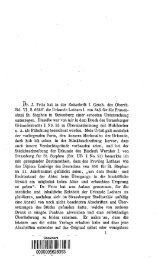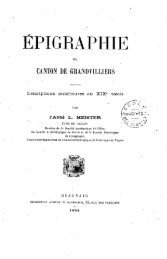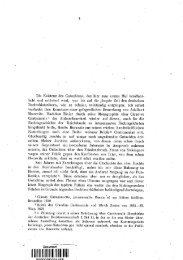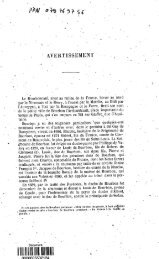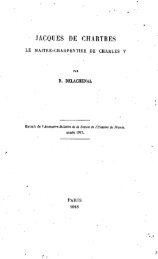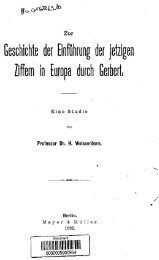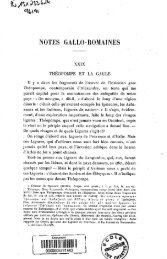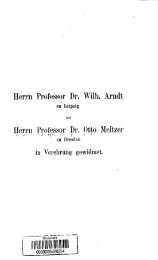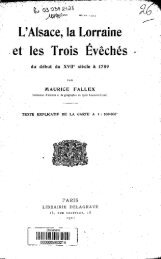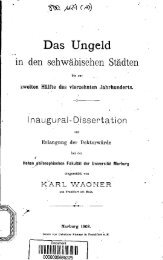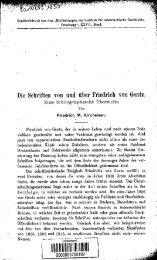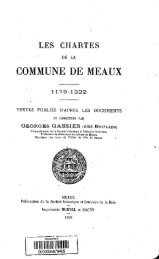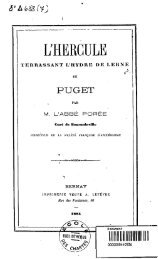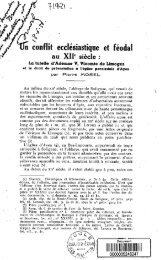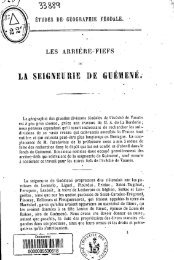4P Li gç(' TRANSACTIONS
4P Li gç(' TRANSACTIONS
4P Li gç(' TRANSACTIONS
You also want an ePaper? Increase the reach of your titles
YUMPU automatically turns print PDFs into web optimized ePapers that Google loves.
846 LE LIVRE DE YCONOMIQUE D'ARISTOTE [TRANS. AMER. PHIL. SOC.<br />
cience, Et est jouxte cc que (lit Nostre Seigneur pluseurs<br />
foiz en l'Apocalipse: Qui vicerit, etc. Et par ce appert que<br />
Aristote crcoit que ceulz qui funt bien en out grande remuneration<br />
de Dieu. Car combien quil die des die.r, Ce<br />
est selon Icconiniun parier qui estoit lors. Car it iie tenoit<br />
fors que it fust seuleinent tin dieu, si comnie it appert oil<br />
.xii .° livre de Met haphisique.<br />
T. Si comme Pindarus disoit qtie telz gens ont le<br />
cuer doulz a soy.<br />
G. Pindarus fu un grant sage, philosoplie et poete. Et<br />
par cc vouloit dire que Ic mcmore de Ia bonne vie que telz<br />
gens ont nienee leur fait avoir une tres douce delectation<br />
an cuer sans amertunie (Ic reniors de conscience. Et pour<br />
cc, les bonnes oevres que len fait en joennece sulit aussi<br />
comme un tresor pour avoir joie et paes en viellece. Et<br />
est selon cc que dit le Prophete: Custodi innocenciarn et<br />
inde equitateni, qui sunt reliquic hoiiiini pacitico. Garde<br />
innocence et resgarde equité, car cc sunt reliques a homme<br />
paisible. Et donques un homme qui a bien vescu oveques<br />
sa bonne fenime fine ses jours delectablement et a paes tie<br />
cuer. Et cc est selon l'Escripture qui dit: Mulier fortis<br />
oblectat virum suurn et annos vite illius in pace inipichit.<br />
Et tel honime est beneuré en cest monde, scion cc que (lit<br />
Maximian : Felix qui meruit tranquillani (lucere vitam et<br />
leto stabiles claudere fine dies.<br />
T. Et l'esperance des mortelz gouverne niout de<br />
manieres de volenté.<br />
G. Cc disoit Pindarus. Et /1 (348a) est selon uris<br />
textes ou it dit: Et s/'es uiortaliion. Et est a dire que<br />
i'esperance que les gens ont en la divinite gouverne icur<br />
volenté. Mes scion autres textes it (lit: Et spes immortalzum<br />
.i Ft est a dire que lesperance que l'en a de obtenir<br />
choses immorteles apres la mort ou i'esperance que l'en a<br />
as diex immortelz gouverne la volenté. Item, cc est scion<br />
uns textes on it dit: Multipi-wem volun.tatem gubernat. Et<br />
est a dire que ceile esperance gouverne mout de manieres<br />
de vertu et volenté. Or senibie donques par cc que dit est<br />
que, scion Aristote et scion Pindarus, ceulz qui bien vivent<br />
en leur bonne posté en attencient a recevoir de Dieu double<br />
merite ou double remuneration, une en present, qui est<br />
leece de cuer et pacs de conscience, et l'autre a venir dont<br />
it ont esperence. Et cc touche Aristote on quint chapitre<br />
du .iX. e d'Elhiques, quant it dit : Operatorum et enilil (Iclectabiles<br />
memorie et futurorum spes bone. Les meniores<br />
des bonnes oevres passees sunt dclectablcs et ics esperances<br />
des clioses a venir sunt honnes. Et en cc it denote double<br />
felicité, une en present et l'autre en futur, en soy concordant<br />
a la Saincte Escripture qui dit an boo homme:<br />
Beatus Cs et bcnc tibi crit. Car scion la giose, cc est a dire<br />
qu'il est heneuré de present par grace et sera apres heneuré<br />
par glore. Et cest double bien on tin resgarde l'anie, Ines<br />
apres it met une autre fin qui resgarde les corps des niariés.<br />
T. Mes le secunt bien est afin que quant it seront<br />
venus a viellece it soient / (348b) pens on flourris par<br />
leur 6hz ou enfans beneurccnient.<br />
G. Cc est assavoir, honestement et delectabiement. Car<br />
combien que filz et lilies soient tenus a Icur parens ct nc<br />
leur pevent recompenser asses, toutesvoies (Ic tant leur<br />
secourent it de plus grande volenté en leur impotence<br />
coninie les parens leur out fais plus de bicns quant it estoient<br />
en leur bonne puissance. Apres it recapitule et<br />
conclut.<br />
And this accords with what our Lord says several times<br />
in the Apocalypse [2: 11; 3: 12, 21, etc.]: "Qui vicerit, etc."<br />
'Thus it appears that Aristotle believed that the righteous<br />
shall have divine remuneration; for although lie says from<br />
thc gods, that is merely the common parlance of his age.<br />
For lie held that there is but one god, as is shown in Metaph<br />
ysics XII [7, 1072h 14 11.].<br />
T. Just as Pindar used to sa y that such people have<br />
hearts kindly disposed to themselves.<br />
G. Pindar was a great sage, philosopher, and poet. By<br />
this he meant to say that the recollection of the good life<br />
they had led affords them a gentle pleasure in their hearts<br />
free from bitter remorse in their consciences. Thus the<br />
good works of their youth are like a treasure providing<br />
joy and peace in old age. This accords with the Prophet's<br />
statement : "\Vatch integrity and look upon right, for there<br />
is a posterity for the man of peace" [Psalm 36: 37]. In<br />
this way a man who has lived righteously with his good<br />
wife ends his days pleasantly with peace in his heart. And<br />
this agrees with the Scriptural statement: 'A noble wife<br />
gladdens her husband and lie lives out his years in peace"<br />
I':cclicus 26: 2]. And such :t man is happy in this world,<br />
;L', .\Iaxiniian says: "Happy the man who has deserved to<br />
live his life in peace and to end his days happily" [Elegy<br />
1, 2$9-9O.<br />
T. And the hope of mortal man dominates many<br />
aspects of his will.<br />
C. Thus Pindar used to say. And // (348a) this translates<br />
the reading of certain texts which have Ri .cpes<br />
nortaliu,n and the meaning is that the hope that people<br />
have in God governs their will. But other texts read Et<br />
.cpes inimortalium and this means that the hope that people<br />
have of obtaining immortal rewards after death or the hope<br />
they place in the immortal gods control their will. And<br />
this conforms with the reading of certain texts in which<br />
lie says M'uitipIice;n voiuuiatem githernat which means that<br />
this hope determines many aspects of virtue and will. Now<br />
it seems from the above that Aristotle and Pindar thought<br />
that those who live righteously according to their best<br />
ability expect to receive for this a double reward or double<br />
recompense fromGod, one in the present time, namely a<br />
joyful heart and a peaceful conscience, and the other in<br />
future time, for which they live in hope. Aristotle touches<br />
upon this subject in Ethics IX, 5, when he says: Operatorum<br />
et en-inn deiectabiies nnemorie et futurorunt spes bone,<br />
meaning that the remembrance of good deeds accomplished<br />
is a delight and the hope of things to come is good. Thus<br />
he notes a double felicity, one present and the other future,<br />
in full agreement with Holy Scripture, which says: "Happy<br />
art thou, and it shall he well with thee" [Psalm 127: 2].<br />
According to the gloss, this signifies that he is happy at<br />
present through grace and will be happy afterward through<br />
glory. And this double benefit or purpose concerns the<br />
soul. But he next mentions another purpose, involving<br />
the bodies of the married couple.<br />
T. But the second benefit to be derived from righteous<br />
living is that when they have conic to their old age<br />
they may be / (348b) fed or cared for affectionately by<br />
their children.<br />
C. That is, honorabl y and agreeably. For although Sons<br />
and daughters owe this to their parents and cannot recompense<br />
theni sufficiently, it is certain that they d this more<br />
willingly for their feeble parents in proporti rn as the latter<br />
have been mindful of their children when they were in<br />
their prime. Next lie suliiiniari zes and concudes.



